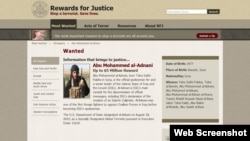Twenty million dollars — that is the latest total of the rewards being offered by the U.S. State Department to anyone who mails, emails or calls in information on four Islamic State commanders leading operations in Iraq and Syria.
Information on Abd al-Rahman Mustafa al-Qaduli, an al-Qaida in Iraq leader before leading the Islamic State, is worth $7 million. Rewards for Abu Mohammed al-Adnani and Tarkhan Tayumurazovich Batirashvili are $5 million each. And information on the whereabouts of Tariq Bin-al-Tahar Bin al Falih al-‘Awni al-Harzi is worth $3 million.
The State Department's Rewards for Justice program is not a kill list. It is a list used to capture and prosecute terrorists. But how can such captures be made?
“Often these individuals aren’t living in Western societies, or even countries where they are reachable,” said Bill Roggio, senior fellow with the Foundation for Defense of Democracies. “They are often living and operating in areas that are in no-go zones, often areas controlled by jihadist groups themselves or their allies, so it’s extremely difficult, even if you can identify where someone is, to go in and arrest them.”
Looks like a kill list
Even if the objective of the State Department’s program is not to kill those it identifies, Roggio said, the reality is that it looks like a kill list from a CIA and Special Operations forces perspective.
“That information is eventually going to enter the U.S. intelligence system, and the CIA, U.S. military and other agencies will have access to that information,” he said. “So it is entirely possible that the information used in the Rewards for Justice program is used to help target and kill terrorist leaders.”
The State Department says that since the program started in 1984, it has paid more than $125 million to more than 80 people who provided “actionable information” that put terrorists behind bars or prevented acts of terrorism.
According to the program’s website, the largest payment to date was $30 million, paid to one individual who provided information that led to Uday and Qusay Hussein, the sons of former Iraqi leader Saddam Hussein. The brothers were killed in 2003 in a firefight with U.S. Special Forces.
David Andelman, editor of World Policy Journal, said the U.S. government should use any tool to trap terrorists, identify them and bring them to justice, but he questioned the tactic of paying for information. For example, he said, al-Qaida and ISIS are rival terrorist organizations, and they could use the State Department program to weaken the competition.
“Are we in fact lining ourselves up with one set of terrorists against another set of terrorists? That is a very important question,” Andelman said in a phone call from New York.
Nomination, approval
The program website says each reward nomination goes through a U.S. investigating agency, which evaluates the information, then nominates a person for a reward. The secretary of state has to then approve it.
Andelman said he would like to see how that payout works. “Who’s going to dole it out? You can’t exactly roll into a U.S. embassy and say, 'Fill up my trunk or suitcase with $100 bills.' Where is this money going? What is it going to be used for?”
Both analysts welcomed the program as a tool to prevent terrorist attacks. But Roggio said that until the U.S. government comes up with an effective, overarching strategy to defeat terrorist networks, arresting or eliminating terrorists one by one will not be ultimately effective.





